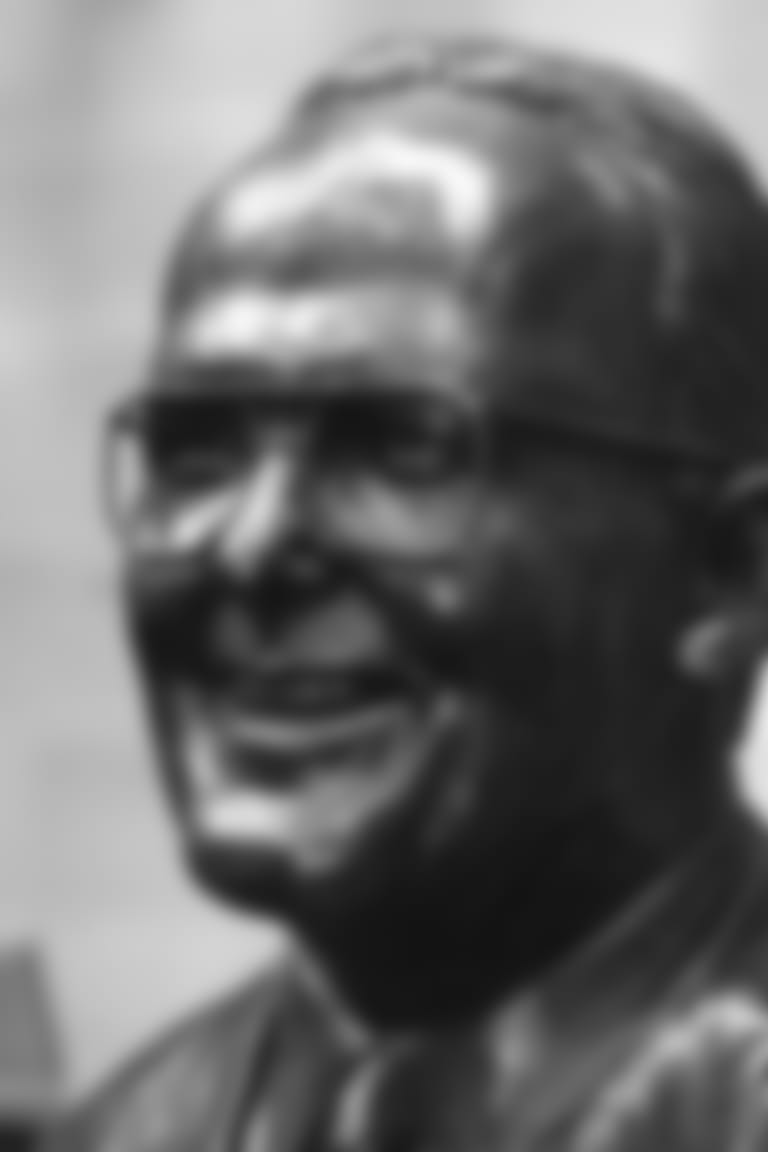Lamar Hunt is universally recognized as one of the greatest sportsmen in American history. No one would have savored the 50th anniversary celebrations for the American Football League and the Chiefs franchise in 2009 or the celebration of the team's 50th season in Kansas City during 2012 more than Hunt, the individual who served as the guiding force behind the formation of both football entities. Hunt served as a positive influence on the game for 47 years dating back to his inception of the American Football League in 1959. He was the first AFL figure to be enshrined into the Pro Football Hall of Fame in 1972, a remarkable feat considering he became involved in the game just 13 years earlier. As the catalyst who brought together the whimsically named "Foolish Club" comprised of the eight original AFL owners, Hunt's "impossible dream" became a reality when his fledgling league took the field for the 1960 season.

On June 8, 1966, the AFL-NFL merger was announced by NFL Commissioner Pete Rozelle, and on Jan. 15, 1967, Hunt's Kansas City Chiefs were participating in the inaugural Super Bowl. "Before there was a player, coach or a general manager in the league, there was Lamar Hunt," late Patriots owner William Sullivan remarked at Hunt's Hall of Fame induction ceremony. "Hunt was the cornerstone, the integrity of the league. Without him, there would have been no AFL."
Despite his many accomplishments, Hunt's humility was one of his most unwavering and endearing traits. While he modestly declined to take credit for his efforts, he truly played an important role in the design, ongoing development and direction of the modern-day National Football League. Whether it was serving as the central figure behind the formation of the AFL, playing a key role in the AFL-NFL merger talks in the 1960s, or overseeing many crucial issues concerning pro football and the Chiefs franchise over five decades, few individuals helped change the face of America's favorite game for the better as much as this quiet Texan.
In addition to being a principal negotiator in the merger of the AFL and NFL in the late 1960s, he was a contributor to the design of the NFL playoff format. He is also credited with unintentionally putting the name "Super Bowl" on the NFL's championship game — the name coming from his children's toy "Super Ball." It was Hunt who not only recommended enumerating each Super Bowl with Roman numerals, but he also suggested that the league's iconic championship trophy bear the name of Vince Lombardi. For years, he was an advocate of the two-point conversion — a college and AFL rule that was finally adopted by the NFL in 1994. Hunt had also lobbied for many years that an additional Thanksgiving game be added to the NFL schedule, efforts that were rewarded when the Chiefs hosted the first-ever Thanksgiving contest at Arrowhead in 2006.

When Arrowhead Stadium re-opened in 2010, Hunt's legacy was honored in Founder's Plaza, an expansive outdoor area that forms a dramatic entrance to the north side of the facility. A nine-foot heroic statue of Hunt stands as a tribute to the Chiefs late founder. In addition, eight fountains for the original eight AFL franchises symbolize Lamar's innovation and dedication to growing the game of football. Perhaps Hunt's biggest influence on the league was his quiet, yet persuasive voice of reason. Hunt's name is rightfully mentioned alongside other legendary family surnames in pro football history such as Halas, Mara and Rooney for his commitment to putting the betterment of the league ahead of any potential individual gain. His AFL model for the equal sharing of television revenue has helped maintain competitive balance in the NFL for many years. As the founder of the AFL, he helped pave the way for much of the modern growth of pro football. Possibly the greatest tribute to his contributions to the sport was the naming of the Lamar Hunt Trophy, which is presented annually to the champion of the American Football Conference. The franchise hoisted the Lamar Hunt Trophy for the first time following the 2019 season, and retained it as AFC Champions following the 2020 season.
The early days of the AFL were problem-filled and often tenuous, but Hunt saw his Dallas Texans achieve on-field success. In 1962, the Texans won the AFL Championship with a double-OT victory over the Houston Oilers, the first of three titles won by his franchise during the league's 10-year existence. Hunt moved his team to Kansas City in 1963, where the organization was renamed the Chiefs.
His team truly put Kansas City on the "big-league" map, thanks to a star-studded squad that was the winningest in the 10-year history of the AFL. The Chiefs were among the first teams to scout and sign players from historically black colleges and universities, a progressive approach that yielded key performers such as DT Buck Buchanan, LB Willie Lanier, WR Otis Taylor and CB Emmitt Thomas. Hunt's team repeated as league champions in both 1966 and 1969. The Chiefs claimed Kansas City's first major sports championship by defeating Minnesota in Super Bowl IV.

In the late 1960s, Hunt was closely involved in the original plans for what is now GEHA Field at Arrowhead Stadium. While other venues of a similar vintage have long since been demolished, the stadium continues to serve as a point of pride for Kansas City. Thanks in large part to the vision and lobbying efforts of Hunt, Jackson County (Missouri) voters approved a 3/8 cent sales tax in April of 2006. That measure raised $250 million for renovation efforts. Hunt's longtime dream of hosting a Super Bowl in Kansas City appeared to become a reality when NFL Commissioner Paul Tagliabue announced on November 16, 2005 that NFL owners had passed a proposal to bring the NFL's championship game to Kansas City in February of 2015.
Unfortunately, a provision in the April 2006 election that would have resurrected the "rolling roof" concept for the stadium did not pass. The "rolling roof" was part of Hunt's initial vision for Arrowhead in the 1960s. In its 21st century incarnation, the "rolling roof" would have provided a climate-controlled facility suitable for hosting the Super Bowl, the Final Four and other major events. Hunt also worked diligently to bring college football to Kansas City. Arrowhead hosted the Dr Pepper Big 12 Conference Championship Game for the fifth time in 2008. In addition to numerous other college football games, the stadium also served as a venue for international soccer matches thanks to Hunt.
During the 1990s, Hunt took great pride in his franchise's on-field resurgence as Kansas City compiled a 102-58 (.638) regular season record. Under Hunt's stewardship, the Chiefs developed an intensely-loyal fan following, not just in mid-America, but across the country and around the globe. Kansas City represented the NFL in four American Bowl contests — Berlin, Germany (1990), Tokyo, Japan (1994, 1998) and Monterrey, Mexico (1996) and has since gone on to host a game in London (2015) and play in Mexico City (2019).
Nicknamed "Games" during his childhood, Hunt's love of sports was his true lifeblood, an enthusiasm which led to his involvement in six different professional sports leagues and seven sports franchises. Hunt was involved in the development of both NASL and World Championship Tennis.
Hunt was inducted into the respective Halls of Fame of both United States Soccer (1982) and International Tennis (1993). He was also honored by the state Sports Halls of Fame of both Texas (1984) and Missouri (1995). In total, Hunt has been selected to 11 "Halls of Fame."

On December 13, 2006 the National Football League and the American sports community lost a true treasure when Chiefs Founder Lamar Hunt passed away in Dallas, Texas, at the age of 74. Hunt was originally diagnosed with prostate cancer in 1998 and quietly underwent many treatments and surgeries over the next eight years. He maintained his active schedule until entering the hospital for the final time on Nov. 22, 2006.
In 2008, Hunt's bust was added to the "Hall of Famous Missourians" at the state capitol in Jefferson City, Missouri. In 1981, Hunt was inducted into the NFL Alumni Association's prestigious Order of the Leather Helmet. He also received the Francis J. "Reds" Bagnell Award from the Maxwell Club in 1993.
In August of 2009, the Lamar Hunt Super Bowl Gallery officially opened at the Pro Football Hall of Fame in Canton, Ohio. This 4,000-square foot exhibit showcases the greatest moments in Super Bowl history and is appropriately named after the individual who gave the world's biggest single-game sporting spectacle its current moniker. In October of 2009, the Missouri DOT officially designated a stretch of I-435 near the Truman Sports Complex as the "Lamar Hunt Memorial Highway."
Truly a sportsman for all seasons, Soccer America Magazine named Hunt one of its "25 Most Influential People" in 1999 after the 95-year-old U.S. Open Cup was renamed the "Lamar Hunt U.S. Open Cup." That same year he also received the U.S. Soccer Federation Hall of Fame Medal of Honor, joining former U.S. Soccer President Alan Rothenberg as the only other individual to earn that prestigious distinction. In 2005, the U.S. Soccer Foundation honored Hunt with its Lifetime Achievement Award.
The Hunt family served as the Investor/Operators of the Kansas City Wizards (Sporting KC) franchise of Major League Soccer from 1995-2006 and claimed the 2000 MLS Cup. They also founded and operated the Columbus Crew for 18 years, eventually selling the operating rights of the Crew in 2013. The Hunt family still oversees the operations of FC Dallas. Hunt was also one of the founding investors in the six-time World Champion Chicago Bulls of the National Basketball Association. In total, the Hunt family owns 16 championship rings from five different professional sports associations (AFL/NFL, MLS, NBA, NASL and the U.S. Soccer "Open Cup").
A highly-successful businessman outside of sports, one of Hunt's most notable innovations was SubTropolis, the world's largest underground business complex, located just north of GEHA Field at Arrowhead Stadium. Hunt also envisioned and developed Worlds of Fun, a 165-acre family entertainment complex which opened in 1973, as well as the 60-acre family water recreation park, Oceans of Fun, which was completed in 1982. While both of those entities were sold in 1995, Hunt Midwest Enterprises continues to oversee a diverse range of business interests.
Hunt was born on Aug. 2, 1932 in El Dorado, Ark., and graduated from SMU with a B.S. in Geology in 1956. While at SMU, he was a three-year reserve end on the varsity football team. Hunt was an avid supporter of his alma mater and was an annual fixture at the Cotton Bowl. In May of 2008, he was posthumously inducted as one of four inaugural members of the SMU Athletics Hall of Fame.
Hunt's wife, Norma, continued to be involved in numerous philanthropic and civic efforts in Texas and in Kansas City until her passing on June 4, 2023. She will be remembered as a loyal wife, loving mother and passionate football fan.
During the 2023 season, players will don a commemorative patch on home and road Chiefs jerseys featuring Norma's initials – "NKH" – at the center of a football. The patch will be worn on the right side of the jersey, serving as a perfect partner to the patch on the jersey's left side honoring Lamar Hunt and the American Football League.

Honoring Norma Hunt
The matriarch of the Hunt Family and the Kansas City Chiefs, Norma Hunt left an indelible mark as a wife, mother and friend. Her zest for life and her passion for Chiefs football live on in the hearts and minds of Chiefs Kingdom. Throughout the 2023 season, the Chiefs will wear a patch in her honor, celebrating the life and legacy of the First Lady of Pro Football.
In addition, the NFL and the Kansas City Chiefs announced the creation of the Norma Hunt Super Bowl Champion of Education program. Beginning with Super Bowl LVIII in Las Vegas, each year one female educator will be selected to attend the game and be honored for their commitment to education, their dedication in the classroom and their selfless service to the next generation of students.
The program honors Norma's passion for education, her lifelong love of football and her renowned Super Bowl attendance streak. Norma was the only woman to attend every Super Bowl – from Super Bowl I when the Chiefs faced the Green Bay Packers, to Super Bowl LVII when the Chiefs hoisted the third Lombardi Trophy in franchise history. Additionally, she was selected to preside over the coin toss at Super Bowl XLI (February 4, 2007) along with Hall of Fame QB Dan Marino.
Norma began her career as a high school teacher. After earning a degree in secondary education from North Texas State University in 1960, she returned to her alma mater at Richardson High School (Richardson, Texas) to serve as an American history teacher.
"My family and I are so proud to honor our mother's life and legacy this season," Chiefs Chairman and CEO Clark Hunt said. "My mom loved football, and she loved the Chiefs. She also believed in the power of sports to unite communities, and the impact sports can have on young people. While it will be difficult to begin football season without her, we look forward to continuing her legacy of attending every Super Bowl with the creation of the Norma Hunt Super Bowl Champion of Education program."


